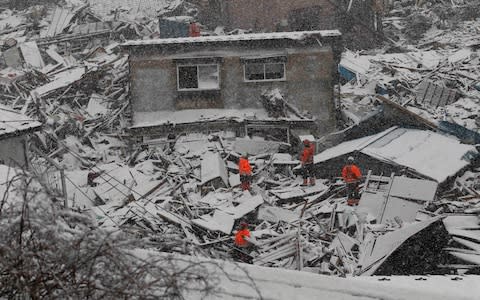Sending too many rescue teams 'makes disasters worse'

Travelling out to post-war Iraq to assist Kurdish communities bombed in the first Gulf War, a group of volunteer UK fire fighters were unknowingly laying the foundations for their country to play a much greater part in global disaster response.
Two years later, in 1993, UK International Search and Rescue was formed and has since spent the last 25 years responding to the world’s worst disasters including in Japan, Nepal, Turkey, Indonesia and Haiti.
However, as he leaves his role as national coordinator Sean Moore, 52, warns that although international disaster response is better than it ever has been rescue teams can bring “disaster on top of disaster” if too many groups descend on a country in the days after an incident.
“It’s got 100 per cent better than it was, but there’s definitely some way to go. For example 76 teams went to Nepal in 2015, which in terms of co-ordination was a disaster on top of a disaster as it put more of a burden on that country that we are meant to do,“ he told The Sunday Telegraph.
“I think disaster prone countries need to consider how best to approach assistance. There are dozens of mega-cities around the world with a population over 10 million and lot of those are on major fault lines. For example Istanbul is overdue a major earthquake and we could be better prepared for it.”

Due to his experience, the father-of-two from Coventry has been involved internationally in the development of policy and guidelines that are used as the global standard as well as training programs taught in over 100 countries.
“All of the disasters I’ve been on I can recall very easily, it’s not about the sites you see but the smells and sounds you get exposed to as well. The desperation you see, these are some of the world’s very worst disasters we get sent to,” he said.
“Every time we have made a rescue, whether I was involved directly or indirectly as my role has changed from hands on to a team leader, every single one of those is a memory for me because its someone’s life and I always put myself in their position and if it was a member of my family.”
Thinking back to the beginnings of the team, which is made up of fire fighters from all across the UK, Mr Moore said they had to beg, borrow and acquire kit any way they could.
But over the last quarter century they have become one of the most respected search and rescue teams in the world, now funded and supported by the Department for International Development.
“I am extremely proud, thinking back 25 years we were a volunteer group that came together with no funding for equipment,” he said.
“We are completely self-sufficient wherever we go in the world, we take 14.5 tonnes of equipment with us. That includes breaking and breaching equipment, shoring to make a buildings safe, all of the welfare equipment like showers, tents, food, water, lighting. Everything you need to survive for ten days we take with us.
“I think back to some of the equipment we had at the start, for lighting we had huge great masts and lamps but now we have LED systems that we can put in a box that will illuminate a whole football pitch.
“We are available 24/7 and can respond out of the UK within six hours, bringing together personnel all over the country along with our equipment.”
Mr Moore described how the Haitian earthquake in 2010 was the worst loss of life he had seen, with the worst destruction coming the year after in the Japanese earthquake and tsunami.
He also described spending days on end cutting a building apart piece by piece in Christchurch, New Zealand, to retrieve 20 dead bodies. During that time he had been liaising with the families and said it was this experience that brought home the importance of body recovery to bring closure to those left grieving.
He said: “I’ve been dreading this point, it’s been one of the biggest things in my life for 28 years, seven days a week my phone is never off.
“I haven’t done it because I have to but because I enjoy it and so it will be strange waking up for the first time in almost 30 years and be out of uniform.
“But I’ve still got lots of experience to give back, so I don’t plan to rest as I love what I do.”


